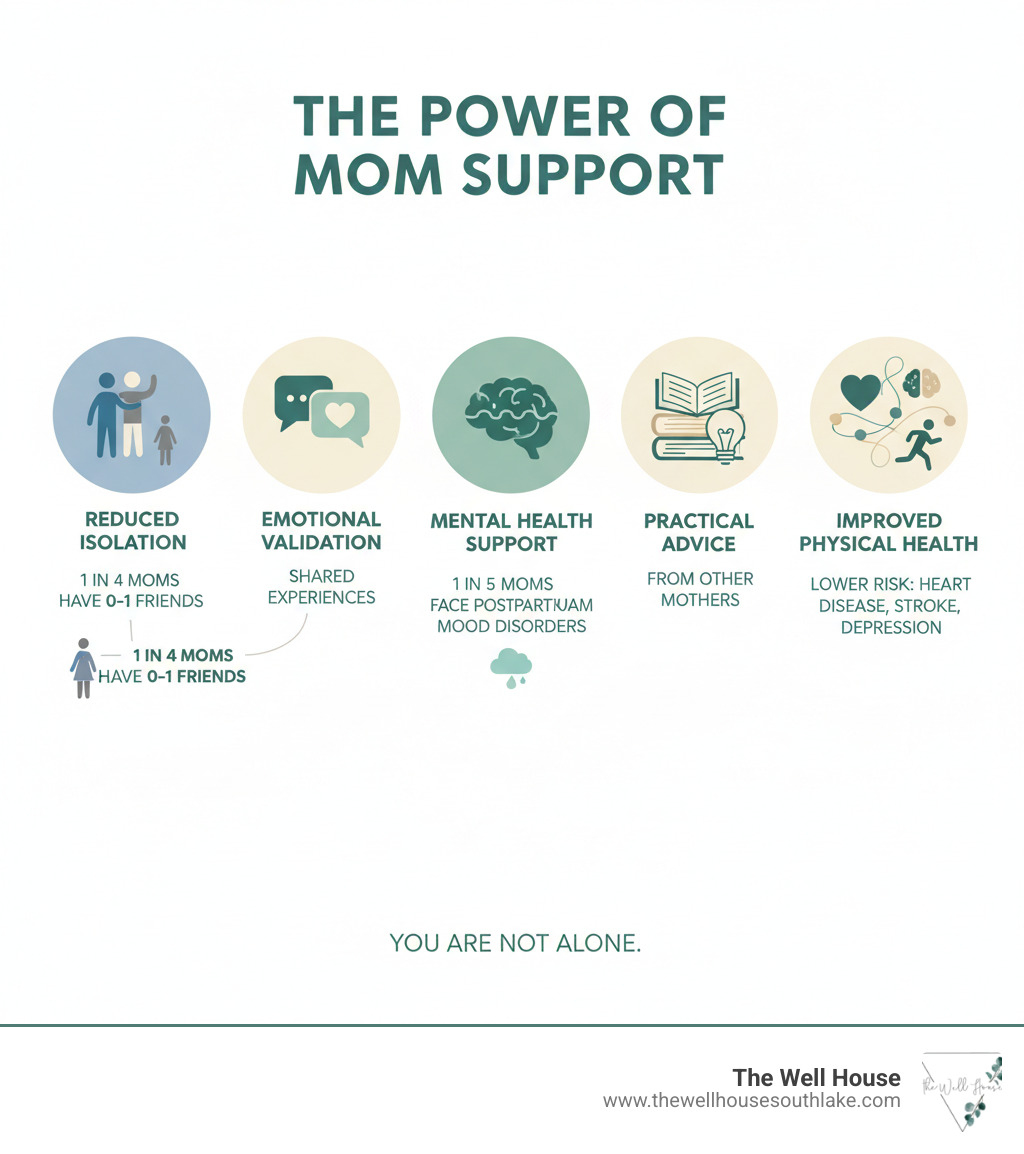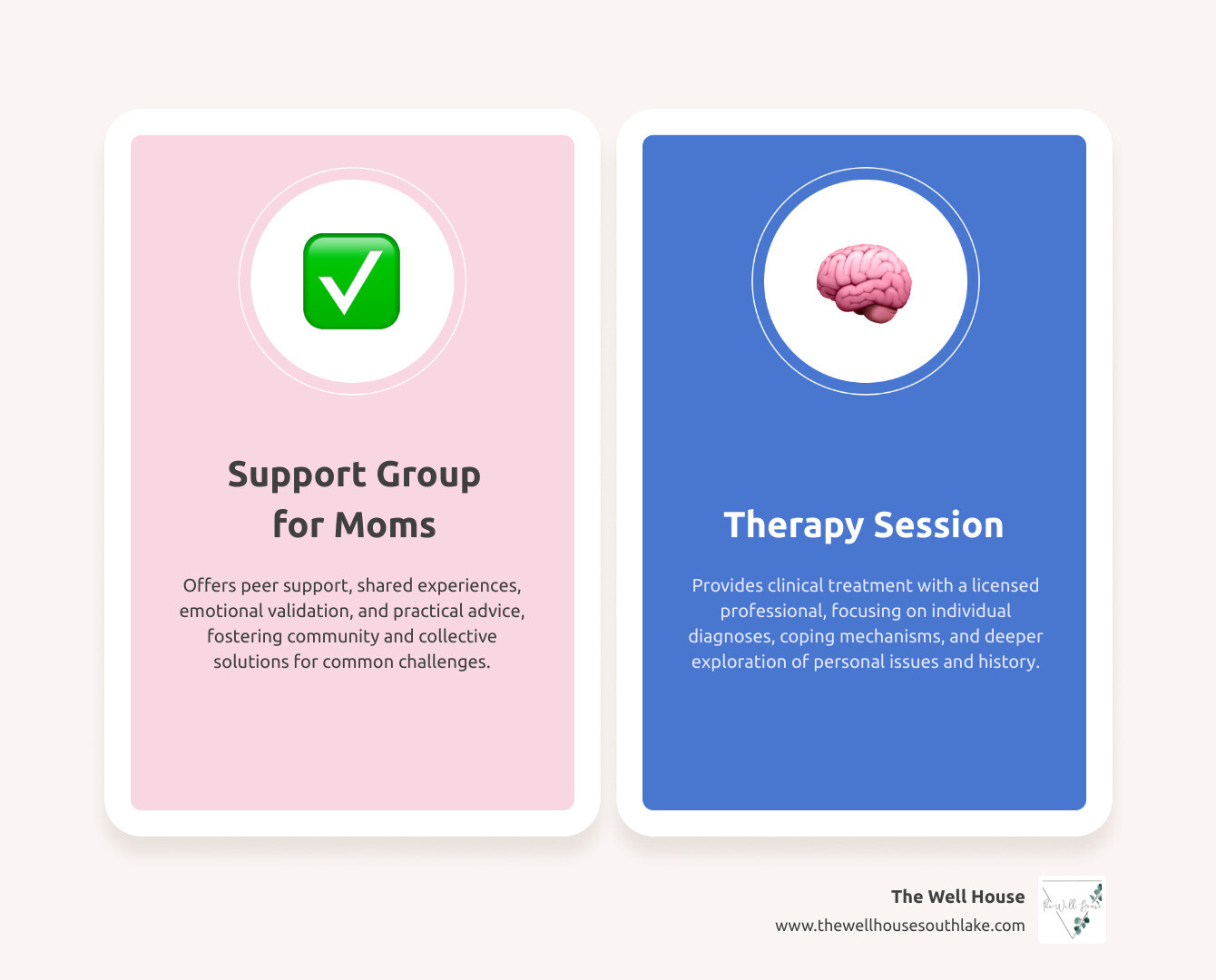You Are Not Alone: Connecting with Support Groups for Moms
Why Connection Matters More Than Ever

A support group for moms can be a lifeline when parenting feels overwhelming. Here’s how to find one that fits your needs:
Quick Guide to Finding Mom Support Groups:
- In-Person Groups – Check local hospitals, community centers, faith organizations, and libraries.
- Online Groups – Join virtual meetups through platforms like Postpartum Support International, The MomCo, or specialized Facebook communities.
- Specialized Options – Seek groups for new moms, working moms, single mothers, or those experiencing postpartum mood challenges.
- What to Expect – A safe, judgment-free space for sharing, typically lasting 1-2 hours with 8-10 participants.
The statistics are sobering: 1 in 4 moms have 0 to 1 friend, and 1 in 5 new mothers experience a perinatal mood and anxiety disorder like postpartum depression. You’re not supposed to do this alone.
Despite living in a hyper-connected world, many mothers feel profoundly isolated. The demands of parenting can make it difficult to maintain friendships, and social media often amplifies feelings of inadequacy. Research confirms that strong social connections are vital, lowering the risk of heart disease, stroke, and depression. Connection isn’t a luxury—it’s essential.
Support groups offer real connection with people who understand what you’re going through. They are a judgment-free space to honestly share the challenges of motherhood, from anxiety and exhaustion to the identity shift that comes with a new baby. Whether you need in-person connection or the flexibility of a virtual group, there’s an option for you.
I’m Jennifer Kruse, a Licensed Professional Counselor Supervisor specializing in motherhood support. I’ve seen how a support group for moms can help mothers find their strength. This guide will walk you through finding the right group for your journey.

Similar topics to support group for moms:
Why Joining a Mom Support Group Can Be a Game-Changer
Becoming a parent is a monumental shift, filled with joy, love, exhaustion, and uncertainty. A support group for moms is a place to exhale and hear a chorus of “YES” when you ask, “Is anyone else struggling with this?”
The power of shared experience is profound. Realizing you’re not failing or broken—just human—is incredibly healing. These groups combat the deep loneliness many mothers feel, creating a space for genuine connection that goes beyond superficial social media posts. The friendships you build can become a lifeline. Scientific research shows that people with strong social connections have a lower risk of heart disease, stroke, and depression. Social support is essential for your health.
In a support group, you’ll find people who celebrate your small wins and understand your struggles without judgment. This village of mutual support helps you not just survive but thrive. Learning to cope with motherhood is easier with a community behind you.
Signs You Might Benefit from a Group
Consider a support group if you’re experiencing any of the following:
- Feeling constantly overwhelmed: If balancing motherhood feels impossible, a group offers practical strategies and a safe place to vent. Learn what to do when you’re feeling overwhelmed.
- Loneliness: You can be surrounded by children yet feel isolated. A group provides the adult conversation you crave.
- Constant worry or anxiety: Hearing other moms share similar concerns about parenting decisions and milestones can normalize your feelings and offer new perspectives.
- Questioning your parenting choices: If self-doubt is consuming, peer support is reassuring. It helps you see there’s no single “right” way to parent.
- Identity shift after baby: Processing the disorienting feeling of not recognizing yourself with others on the same journey can help you refind who you are now.
How Groups Address Postpartum Depression and Anxiety

Perinatal mood and anxiety disorders (PMADs) affect one in five new mothers and require real support. A support group for moms provides a confidential, judgment-free environment to talk about symptoms of depression, anxiety, or intrusive thoughts without fear of being labeled a “bad mom.”
This open sharing reduces stigma. Hearing another mother describe similar feelings helps you realize you’re not alone and are dealing with a common medical condition. The “me too” from someone who truly understands is uniquely comforting.
Many groups are facilitated by licensed perinatal therapists who guide discussions, teach coping skills, and provide practical strategies. They clarify that a support group complements professional treatment but doesn’t replace it. These groups can reduce isolation, increase confidence, and empower you to seek additional help if needed, bridging the gap to clinical services. For more information, see our resource on postpartum support: help for depression and anxiety.
Finding Your Tribe: Different Types of a Support Group for Moms
Support groups for moms come in many forms, ensuring you can find one that fits your life and specific needs. Whether you prefer in-person connection or the flexibility of an online group, the right postpartum support for moms is out there.
In-Person vs. Online Groups
Choosing between in-person and online comes down to your schedule and preferences. Both offer valuable connection.
In-person groups meet at local community centers, hospitals, or libraries. They offer face-to-face interaction and the chance to build local friendships that extend beyond meeting times. The non-verbal cues and shared physical space can create deep bonds.

Online or virtual groups are lifesavers for those with logistical challenges like living in a rural area or lacking childcare. They offer incredible flexibility and overcome geographical barriers, allowing access to specialized support that may not be available locally. You can find online support meetings through Postpartum Support International on a wide range of topics. For many, online groups are the most realistic and vital source of connection.
Specialized Groups for Unique Journeys
Beyond general support, specialized groups cater to specific experiences:
- New moms groups: Focus on the early postpartum period, covering topics like feeding, sleep, and the maternal identity shift.
- Working moms: Address the unique pressures of balancing a career with motherhood.
- Single mothers: Offer community and resources for those navigating parenthood solo. Our practice also provides single mothers counseling: the complete guide.
- Moms of multiples: Connect you with others who understand the unique logistics and exhaustion of raising twins, triplets, or more.
- Moms of children with special needs: Provide a space to share resources, advice, and emotional support with parents on a similar path.
- Pregnancy loss: Specialized programs like the Pregnancy Loss Support Program offer a safe space for grieving parents to heal.
What to Expect from a Support Group for Moms
Walking into your first meeting can be nerve-wracking, but most groups follow a similar, welcoming structure.
- Format: Sessions typically begin with introductions, followed by open sharing or a guided topic. The environment is a judgment-free zone where authenticity is encouraged.
- Confidentiality: What’s shared in the group stays in the group, building the trust needed for open conversation.
- Structure: Groups are usually small (8-10 moms) and last 1-2 hours to ensure everyone can participate.
- Facilitators: Groups may be peer-led by an experienced mom or professionally-facilitated by a licensed therapist who guides the discussion and maintains a safe environment.
- Costs: Fees vary. Some community groups are free or donation-based, while professionally-led groups may have a fee. Many offer sliding scales, so always inquire about cost.
Your Roadmap to Connection: How to Find the Right Group
Finding support groups for moms is easier than you might think. The key is to explore both online and local networks to find the right fit for your personality and needs.
Start by asking trusted professionals like your child’s pediatrician or your doula, as they often have knowledge of local parent resources. Use online searches with terms like “mom support group” plus your city name (e.g., Southlake, Westlake, Grapevine, Roanoke, or Trophy Club). Facebook is also a hub for local parenting groups, though they may be less structured than formal support groups.
Once you find potential groups, reach out and ask about their format, facilitator, and if you can try a session. Trust your gut—the right group will feel welcoming from the start.
How to Find a Local Support Group for Moms
If you’re seeking in-person connection, your community has many resources:
- Local hospitals and birthing centers: Many offer postpartum support, new parent classes, or breastfeeding groups (like La Leche League).
- Community centers (JCCs, YMCAs): Frequently host parenting programs, classes, and support circles.
- Local libraries: A great source for finding or being directed to parent groups.
- Faith-based organizations: Churches, synagogues, and mosques often have family ministries that host groups.
- Apps like Meetup and Peanut: These are designed to help you find local groups based on shared interests, including parenting.
If you need help clarifying your needs, parent coaching expert guidance can provide custom support for your search.
Finding Inclusive and Affirming Spaces
A true safe haven must honor all aspects of your identity. If you are a BIPOC mom or part of the LGBTQIA+ community, seek out groups that explicitly welcome you. Use search terms like “BIPOC moms support group” or “LGBTQ+ parents group.”
Don’t hesitate to ask groups about their inclusivity policy. A welcoming community will be happy to discuss how they create a safe and affirming space for all members. Look for groups that state their values of inclusivity upfront. If you can’t find a local fit, virtual groups can connect you with mothers who share your specific identities and experiences from across the country.
Contributing to or Leading a Group
If you’ve benefited from a group, you might feel inspired to give back or start your own. You can begin informally by inviting a few local moms for coffee. Organizations like The MomCo (formerly MOPS International) and the International MOMS Club offer resources and frameworks for starting local or online chapters, so you don’t have to do it alone.
You don’t need professional credentials to foster connection. Your life experience and ability to make others feel comfortable are valuable assets. Whether leading or participating, your authentic presence helps build the strong community that all mothers deserve.
Support Group vs. Therapy: What’s the Difference?
Understanding the difference between a support group for moms and therapy can help you choose the right path for your needs. While both offer valuable support, they serve different purposes.
A support group is about peer connection, shared experience, and community. It’s a place to feel less alone by talking with other moms navigating similar challenges. Therapy, on the other hand, is a clinical service provided by a licensed professional to address specific mental health concerns, process trauma, and develop personalized coping strategies.
Support groups are not a substitute for therapy but can be a powerful complement to it. The table below breaks down the key distinctions:

| Aspect | Support Group for Moms | Therapy Session |
|---|---|---|
| Goal | Peer support, shared experience, emotional validation, community building, practical advice. | Clinical treatment, addressing individual diagnosis/concerns, processing trauma, developing coping mechanisms. |
| Leader | Facilitator (may be a peer, volunteer, or licensed professional), guides discussion. | Licensed therapist, counselor, or psychologist with specialized training. |
| Focus | Collective experience, common challenges, shared solutions, feeling less alone. | Individual’s specific thoughts, feelings, behaviors, history, and goals. Deeper exploration of personal issues. |
| Structure | Often less formal, open sharing, guided topics, flexible attendance (some drop-in). | Structured, typically 45-60 minute sessions, scheduled appointments, follows a treatment plan. |
| Confidentiality | Encouraged and respected by members, but not legally bound in the same way as therapy. | Legally mandated confidentiality (with exceptions for harm to self/others). |
| Cost | Often free, low-cost, or donation-based. | Professional fees, may be covered by insurance. |
| Relationship | Peer-to-peer connection, mutual support. | Patient-provider relationship, professional guidance. |
| Role of Leader | Facilitates discussion, ensures safety, provides resources (if professional). | Provides clinical expertise, therapeutic interventions, diagnosis (if applicable), and personalized treatment. |
Many mothers find that attending a support group for community while also seeing a therapist for individual work is the perfect combination. If you’re craving connection, a group is a great start. If you’re struggling with symptoms that interfere with daily life, therapy is the recommended choice. For example, a therapist can teach you specific strategies to calm down with anxiety.
For a deeper dive, explore the ultimate guide to therapy options for moms. Taking any step toward getting support is a sign of strength.
Conclusion
Motherhood is a profound journey, but it doesn’t have to be a lonely one. The isolation many moms feel is common, but it is not inevitable. A support group for moms can transform your experience by providing irreplaceable connection, emotional validation, and genuine friendship.
Whether you find your village in an in-person group in Southlake, Westlake, Grapevine, Roanoke, or Trophy Club, or join a virtual circle, you are taking a powerful step. Choosing connection over isolation is an act of wisdom. Take that first step—search for a group, show up, and share your story. Your village is waiting.
If you find you need more than peer support for challenges like anxiety or depression, that’s okay. The therapists at The Well House offer expert, compassionate care for mothers. We provide individualized mental health services with a holistic approach, available both in-person and via telehealth.
You are not alone, you are not failing, and you deserve support. Whether from a group, a therapist, or both, you are worth the effort. If mom life feels out of control, we’re here to help you find your footing.









